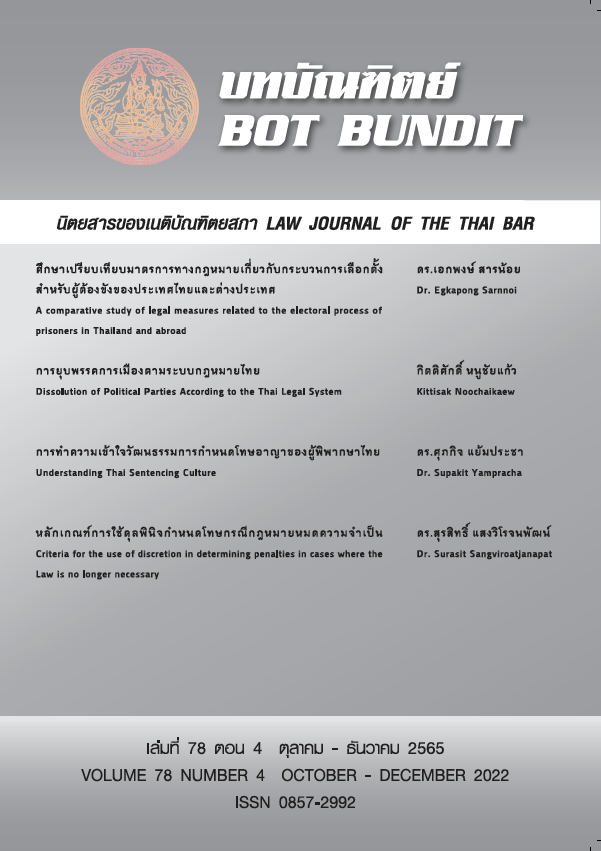การทำความเข้าใจวัฒนธรรมการกำหนดโทษอาญาของผู้พิพากษาไทย
Main Article Content
บทคัดย่อ
การศึกษาวิจัยนี้มีวัตถุประสงค์เพื่อค้นหาคุณลักษณะสำคัญของวัฒนธรรมการกำหนดโทษอาญาของผู้พิพากษาไทยและสังเคราะห์ทฤษฎีเพื่อความเข้าใจคุณลักษณะสำคัญนั้น วัตถุแห่งการศึกษาหลักไม่ใช่ประมวลกฎหมายอาญาแต่คือบัญชีมาตรฐานโทษหรือ “ยี่ต๊อก” ซึ่งมีเนื้อหาเป็นความลับไม่เปิดเผยต่อสาธารณะและบุคคลที่อยู่นอกวงการศาลจะไม่ทราบว่ายี่ต๊อกนี้มีกลไกการบังคับใช้อย่างไร เป้าหมายคือเพื่อทราบว่ายี่ต๊อกทำงานอย่างไรเพื่อบรรลุวัตถุประสงค์ในการสร้างความสม่ำเสมอและความพร้อมรับผิดชอบในการกำหนดโทษอาญา
ผลการศึกษาพบว่าผู้พิพากษาไทยมีความคุ้นเคยกับข้อความคิดในเรื่องความสม่ำเสมอ และความพร้อมรับผิดชอบในการกำหนดโทษอาญา แม้ว่าศาลชั้นต้นแต่ละศาลต่างมียี่ต๊อกคนละฉบับ แต่ข้อมูลจากการประชุมกลุ่มผู้พิพากษาศาลชั้นต้นหลายศาลพบว่าความแตกต่างในเนื้อหาของยี่ต๊อกอาจจะมีไม่มากนัก นอกจากผู้พิพากษาจะมีหน้าที่กำหนดโทษอาญาให้เป็นไปตามประมวลกฎหมายอาญา ซึ่งหากมีข้อผิดพลาดก็จะถูกตรวจสอบโดยศาลชั้นที่สูงกว่าแล้ว โดยนิติประเพณีของศาลยุติธรรม ผู้พิพากษาศาลชั้นต้นยังต้องปฏิบัติตามยี่ต๊อกในศาลของตนเองและหากจะกำหนดโทษอาญาให้แตกต่างออกไปจะต้องปรึกษาผู้พิพากษาหัวหน้าศาล แม้จะไม่มีกฎหมายฉบับใดกำหนดหน้าที่ของผู้พิพากษาที่ต้องกำหนดโทษอาญาตามยี่ต๊อก แต่ผลการศึกษาพบว่าผู้พิพากษาส่วนใหญ่ดูเหมือนมีความเต็มใจที่จะกำหนดโทษอาญาตามยี่ต๊อก การที่ผู้พิพากษาทุกคนในศาลเดียวกันล้วนกำหนดโทษอาญาตามยี่ต๊อกทำให้สามารถบรรลุเป้าหมายในการสร้างความสม่ำเสมอของผลการกำหนดโทษอาญาได้ สำหรับข้อความคิดเรื่องความพร้อมรับผิดชอบในการกำหนดโทษอาญา ผู้พิพากษาไทยเข้าใจว่าหมายถึงการให้หลักประกันว่าผู้พิพากษาจะปฏิบัติตามนิติประเพณีและมาตรฐานขั้นสูงทางจริยธรรม
ผลการศึกษาพบคุณลักษณะที่สำคัญสามประการของวัฒนธรรมการกำหนดโทษอาญาของผู้พิพากษาไทย คือ ความคล้อยตามกันในกระบวนการตัดสินใจเพื่อกำหนดโทษอาญา แนวโน้มที่จะกำหนดโทษอาญาจำคุกเป็นหลัก และการไม่ตระหนักถึงความจำเป็นที่ต้องมีความพร้อมรับผิดชอบต่อสาธารณะในการกำหนดโทษอาญา คุณลักษณะทั้งสามประการสามารถทำความเข้าใจได้โดยอาศัยทฤษฎีที่วางอยู่บนพื้นฐานของข้อความคิดที่สำคัญสองประการคือ โครงสร้างทางตุลาการในระบบผู้พิพากษาอาชีพ และบริบททางการเมือง สังคมและวัฒนธรรมของประเทศไทย
Article Details

อนุญาตภายใต้เงื่อนไข Creative Commons Attribution-NonCommercial-NoDerivatives 4.0 International License.
เอกสารอ้างอิง
Alain Berthoz, Emotion and Reason: The Cognitive Neuroscience of Decision-Making (Oxford University Press 2006).
Andrew Ashworth, Sentencing and Criminal Justice (Cambridge University Press 2010).
Andrew Ashworth, Andrew von Hirsch and Juian Roberts, Principled Sentencing: Readings on Theory and Policy (3rd edn, Hart 2009).
Andrew Von Hirsch and Andrew Ashworth, Proportionate Sentencing: Exploring the Principles (Oxford University Press 2005).
Anja Seibert-Fohr (ed), Judicial Independence in Transition (Springer-Verlag 2012).
Brian H. Bornstein and Richard L. Weiner (eds), Emotion and the Law: Psychological Perspective (Springer 2010).
Catherine Fitzmaurice and Ken Pease, The Psychology of Judicial Sentencing (Manchester University Press 1986).
Chris Clarkson and Rod Morgan (eds), The Politics of Sentencing Reform (Clarendon Press 1995).
Colin Munro and Martin Wasik (eds), Sentencing, Judicial Discretion and Training (Sweet & Maxwell 1992).
Cyrus Tata and Neil Hutton (eds), Sentencing and Society (Ashgate 2002).
Dan Ariely, The Upside of Irrationality: The Unexpected Benefits of Defying Logic at Work and at Home (HarperCollins Publishers 2010).
Daniela Piana, Judicial Accountabilities in New Europe: From Rule of Law to Quality of Justice (Ashgate 2010).
David Nelken (ed), Contrasting Criminal Justice (Ashgate 2000).
Esin Örücü (ed), Mixed Legal Systems At New Frontiers (Wildy, Simmonds and Hill Publishing 2010).
Geraldine Mackenzie, How Judges Sentence (Federation Press 2005).
Hakeem O. Yusuf, Transitional Justice, Judicial Accountability and the Rule of Law (Routledge 2010).
Ioan Durnescu and Fergus McNeill, Understanding Penal Practice (Routledge 2014).
Keith Hawkins (ed), The Uses of Discretion (Clarendon Press 1992).
Keith Hawkins, Law as Last Resort Prosecution Decision-making in a Regulatory Agency (Oxford University Press 2002).
Loraine Gelsthrope and Nicola Padfield (eds), Exercising Discretion Decision-Making in the Criminal Justice System and Beyond (Willan Publishing 2003).
Marcus Bank, Using Visual Data in Qualitative Research (Sage 2007).
Martin Shapiro, Courts: A Comparative and Political Analysis (University of Chicago Press 1981).
Michael Lipsky, Street-level Bureaucracy Dilemmas of the Individual in Public Services (Russell Sage Foundation 1980).
Michael Tonry, Sentencing Matters (Oxford university Press 1996).
Michael Tonry (ed), Crime, Punishment and Politics in Comparative Perspective Crime and Justice: A Review of Research Volume 36 (University of Chicago Press 2007).
Michael Tonry and Richard S. Frase (eds), Sentencing and Sanctions in Western Countries (Oxford University Press 2001).
Mike Broussine (ed), Creative Methods in Organizational Research (Sage 2008).
Mirjan R. Damaška, The Faces of Justice and State Authority: A Comparative Approach to the Legal Process (Yale University Press 1986).
Martin Wasik and Sotirios Santatzoglou (eds), The Management of Change in Criminal Justice: Who Knows Best?, (Palgrave Macmillan 2015).
Penny Darbyshire, Sitting in Judgment The Working Lives of Judges (Hart 2011).
Peter Cane and Herbert M. Kritzer (eds), The Oxford Handbook of Empirical Legal Research (Oxford University Press 2010).
Peter De Cruz, Comparative Law in a Changing World (3rd edn, Routledge-Cavendish 2008).
Reza Banakar and Max Travers, An Introduction to Law and Social Theory (2nd edn, Hart 2013).
Richard Frase, Just Sentencing Principles and Procedures for a Workable System (Oxford University Press 2013).
Rob C. Mawby and Anne Worrall, Doing Probation Work Identity in a Criminal Justice Occupation (Routledge 2013).
Seán Doran and John D. Jackson (eds), The Judicial Role in Criminal Proceeding (Hart 2000).
Simon Halliday and Patrick Schmidt (eds), Conducting Law and Society Research Reflections on Methods and Practices (Cambridge University Press 2009).
Shimon Shetreet and Sophie Turenne, Judges on Trial: The Independence and Accountability of the English Judiciary (2nd edn, Cambridge University Press 2013).
Standley Cohen, States of Denial Knowing about Atrocities and Suffering (Polity Press 2001).
Tom Bingham, The Rule of Law (Penguin Books 2010).
Tom Daems, Dirk van Zyl Smit, and Sonja Snacken (eds), European Penology? (Hart 2013).


